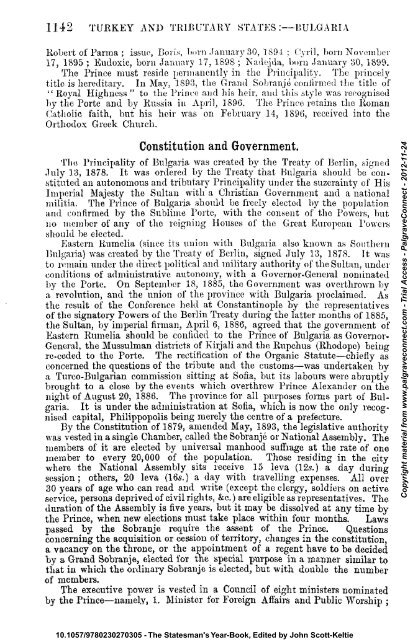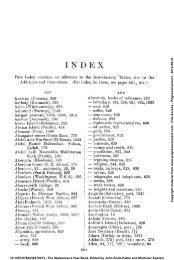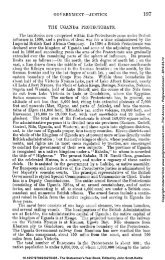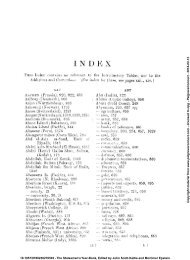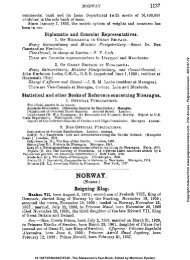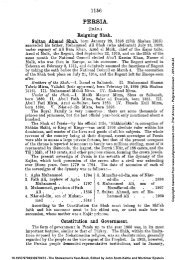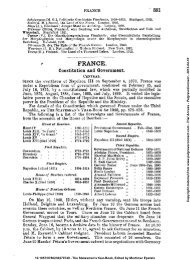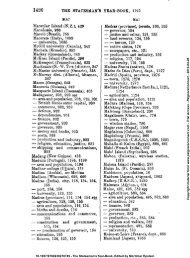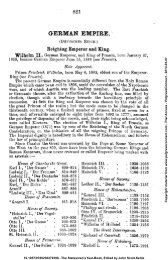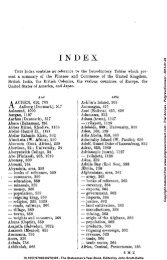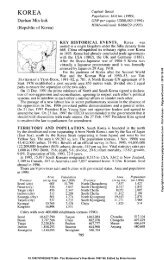Bulgaria - Palgrave Connect
Bulgaria - Palgrave Connect
Bulgaria - Palgrave Connect
Create successful ePaper yourself
Turn your PDF publications into a flip-book with our unique Google optimized e-Paper software.
1142 TURKEY AND TRIBUTARY STATES .-—-BULGARIA<br />
Robert of Parma ; issue, Boris, burn January 30, 189-1 ; Cyril, born November<br />
17, 1895 ; Eudoxie, born January 17, 1898 ;' Nadejda, born January 30, 1899.<br />
The Prince must reside permanently in the Principality. The princely<br />
title is hereditary. In May, 1893, the Grand Sobranje coniirmed the title of<br />
" Royal Highness " to the Prince and his heir, and this style was recognised<br />
by the Porte and by Russia in April, 1896. The Prince retains the Roman<br />
Catholic faith, but his heir was on February 14, 1896, received into the<br />
Orthodox Greek Church.<br />
Constitution and Government.<br />
The Principality of <strong>Bulgaria</strong> was created by the Treaty of Berlin, signed<br />
July 13, 1878. It was ordered by the Treaty that <strong>Bulgaria</strong> should be constituted<br />
an autonomous and tributary Principality under the suzerainty of His<br />
Imperial Majesty the Sultan with a Christian Government and a national<br />
militia. The Prince of <strong>Bulgaria</strong> should be freely elected by the population<br />
and confirmed by the Sublime Porte, with the consent of the Powers, but<br />
no member of any of the reigning Houses of the Great European Powers<br />
should be elected.<br />
Eastern Rumelia (since its union with <strong>Bulgaria</strong> also known as Southern<br />
<strong>Bulgaria</strong>) was created by the Treaty of Berlin, signed July 13, 1878. It was<br />
to remain under the direct political and military authority of the Sultan, under<br />
conditions of administrative autonomy, with a Governor-General nominated<br />
by the Porte. On September 18, 1885, the Government was overthrown by<br />
a revolution, and the union of the province with <strong>Bulgaria</strong> proclaimed. As<br />
the result of the Conference held at Constantinople by the representatives<br />
of the signatoiy Powers of the Berlin Treaty during the latter months of 1885,<br />
the Sultan, by imperial firman, April 6, 1886, agreed that the government of<br />
Eastern Rumelia should be confided to the Prince of <strong>Bulgaria</strong> as Governor-<br />
General, the Mussulman districts of Kirjali and the Rupchus (Rhodope) being<br />
re-ceded to the Porte. The rectification of the Organic Statute—chiefly as<br />
concerned the questions of the tribute and the customs—was undertaken by<br />
a Turco-<strong>Bulgaria</strong>n commission sitting at Sofia, but its labours were abruptly<br />
brought to a close by the events which overthrew Prince Alexander on the<br />
night of August 20, 1886. The province for all purposes forms part of <strong>Bulgaria</strong>.<br />
It is under the administration at Sofia, which is now the only recognised<br />
capital, Philippopolis being merely the centre of a prefecture.<br />
By the Constitution of 1879, amended May, 1893, the legislative authority<br />
was vested in a single Chamber, called the Sobranje or National Assembly. The<br />
members of it are elected by universal manhood suffrage at the rate of one<br />
member to every 20,000 of the population. Those residing in the eity<br />
where the National Assembly sits receive 15 leva (12s.) a day during<br />
session; others, 20 leva (16s.) a day with travelling expenses. All over<br />
30 years of age who can read and write (except the clergy, soldiers on active<br />
service, persons deprived of civil rights, &c.) are eligible as representatives. The<br />
duration of the Assembly is five years, but it may be dissolved at any time by<br />
the Prince, when new elections must take place within four months. Laws<br />
passed by the Sobranje require the assent of the Prince. Questions<br />
concerning the acquisition or cession of territory, changes in the constitution,<br />
a vacancy on the throne, or the appointment of a regent have to be decided<br />
by a Grand Sobranje, elected for the special purpose in a manner similar to<br />
that in which the ordinary Sobranje is elected, but with double the number<br />
of members.<br />
The executive power is vested in a Council of eight ministers nominated<br />
by the Prince—namely, 1. Minister for Foreign Affairs and Public Worship ;<br />
10.1057/9780230270305 - The Statesman's Year-Book, Edited by John Scott-Keltie<br />
Copyright material from www.palgraveconnect.com - Trial Access - <strong>Palgrave</strong><strong>Connect</strong> - 2012-11-24


